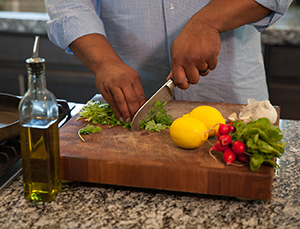There are different kinds of fats in the foods you eat. Fats can be saturated or unsaturated. Saturated fat can raise the level of cholesterol in your blood. Too much cholesterol in your blood can lead to blocked arteries. When you do eat fat, choose unsaturated fats. A healthy goal is to have less than
Limit saturated fats
Saturated fats are fats that come from animals. They also come from certain plants such as coconut and palm. Eating saturated fat can raise your blood cholesterol level. This can make artery problems worse. Your goal is to eat less saturated fat. Below are some examples of foods that contain a lot of saturated fat.
-
Fatty cuts of meat (lamb, ham, beef)
-
Cookies and cakes
-
Cream, ice cream, sour cream, cheese, butter
-
Desserts with butter and cream
-
Sauces with butter and cream
-
Salad dressings with saturated fats
-
Foods that contain palm or coconut oil
Avoid trans fat
Like saturated fat, trans fat is linked to heart disease. Trans fat is found in liquid unsaturated fats that have been changed to be solid at room temperature. Margarine, which is often made from vegetable oil, is an example. Trans fat is often found in cookies, pastries, and other products. Check food labels for trans fat. Also, look at the ingredients list for partially hydrogenated oils.
The FDA has banned adding partially hydrogenated oils to foods. Partially hydrogenated oils are the main dietary source of artificial trans fat in processed foods.
Choose unsaturated fats
Unsaturated fats are usually liquid at room temperature. They are better choices than saturated fats. In fact, in moderate amounts, unsaturated fat can be good for your heart. There are two types of unsaturated fats:
-
Polyunsaturated fats. These are found in corn oil, safflower oil, sunflower oil, and other vegetable oils.
-
Monounsaturated fats. These are found in avocados, olive oil, canola oil, and peanut oil. Some margarines and spreads are now made with these oils, too. Of all fats, monounsaturated fats cause the least harm to your heart.


